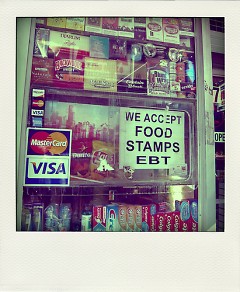In July, the Michigan Legislature passed HB 4409. This piece of legislation will limit families to 48 months of benefits under the Family Independence Program (FIP). The food stamp program, a component of FIP, will be affected by the passage of this bill.
How dependent are Americans on the food stamp program? The data is interesting, if not surprising.
As to be expected, participation in the program has increased dramatically since the recession began. By April of this year, 45 million Americans, one in seven, were using food stamps up from 27 million in 2008. Still the administrator of the program, the Department of Agriculture, estimated that only two-thirds of those eligible had signed up for it. In percentage terms, the cost of the program has increased even more, from $35 billion to $65.
Nationwide, approximately half of food stamp recipients are children and 8% are seniors. While the threshold for receiving benefits is 130% of the federal poverty level, only 14% even live on poverty level income. Of those 41% live below the poverty level and 18% have no income. With an average of only $101 in family savings or valuables, most recipients have little to fall back on.
Food stamp benefits are dependent on income, assets, and family size. The average benefit is $133 per month with a maximum of $200 for an individual with no income.
It is argued that the rise in food stamp usage shows that the program works as intended. Rules on eligibility for food stamps are suspended during times of great need. Other benefits to the needy are not as flexible. Unlike unemployment benefits, which currently run for 99 weeks, food stamps go immediately and indefinitely to those in need automatically. Likewise, Temporary Assistance to Needy Families (TANF) funding grows much more slowly during difficult times because the funding does not grow with demand but as block grant to states. The federal food stamp program is now coming under scrutiny. Changes to the program as it currently stands are likely to follow.
Reduction in food stamp benefits are part of the budget discussions in Washington. Combined with the passage of HB 4409 in Michigan, a federal cut in benefits would cause further hardship in SECOM's neighborhood.
Throughout Michigan, it is estimated that 12,600 people will be affected immediately by passage of HB 4409. State Senator Hood, in opposition to the bill, said in part, "My question is: What is going to happen to these folks? Has anybody thought about that? On the day of enactment of this legislation, approximately 12,000 folks will be impacted. Where will those 12,000 people go the next day? Where are they going to go to get food?"
(Read the full Senate Journal of July 13, 2011 regarding HB 4409.)
How many of those 12,000 people live in Grand Rapids? How many will need alternative or additional assistance? No one knows.
It was a given that the day would come when government deficits would require cuts in spending. That day may now be upon us. Having an improving employment situation by now would have been the preferred scenario. Instead, the economically disadvantaged in Grand Rapids are facing greater challenges in the near term.
If it is true that it is necessary to be humble in the good times and stoic in the difficult times, the next year promises to be one of continued stoicism.
The Rapidian, a program of the 501(c)3 nonprofit Community Media Center, relies on the community’s support to help cover the cost of training reporters and publishing content.
We need your help.
If each of our readers and content creators who values this community platform help support its creation and maintenance, The Rapidian can continue to educate and facilitate a conversation around issues for years to come.
Please support The Rapidian and make a contribution today.


Comments
I'm glad that The Rapidian gave me a heads up on this. I had no idea that this piece of legislation was passed. I'm curious to know whether the 48 months takes effect from the date the law was passed or if "lifetime" truly means that people will lose benefits immediatly. I clicked on the link above to try to find an answer but I couldn't find one.
Also, please aware that there is a huge food giveaway today (Friday, July 29th) at 6pm at an American Legion post located at 658 Michigan Street NE Grand Rapids, MI 49503.
I have seen this information on Facebook as well, about "multiple trucks" at the American Legion post. Then, however, I saw that a correction had been made: There is only one truck, and the American Legion wanted to make sure people were aware that it's not a "huge giveaway" but just one truck with food designated for that neighborhood. It seems the "telephone" game has gotten the information a little blown up beyond the actual size of the food distribution!
I still consider 200 families a huge food giveaway. I think that makes a great impact for those 200 families.
Just wanted to make sure people found out that unlike the multi-truck description that has been floating around on social media, it's one truck. Here is the correction I saw: "In regards to the update about the American Legion food giveaway: CLARIFICATION: This will be a typical mobile food pantry with only ONE truck of food that can serve a limited number of households. This is not a large, multi-truck food giveaway, but one mobile food pantry designed to serve the Legion's immediate neighborhood."
If you live in the area bounded by US 131, Hall St., Patterson Ave, and 28th St., SECOM can help you with your food needs. If you live outside of that area, but within Kent County, contact Access of West Michigan or call 2-1-1 to find the pantry in your area.
Please forward that information to anyone that is need. No one in Kent County should be going hungry.